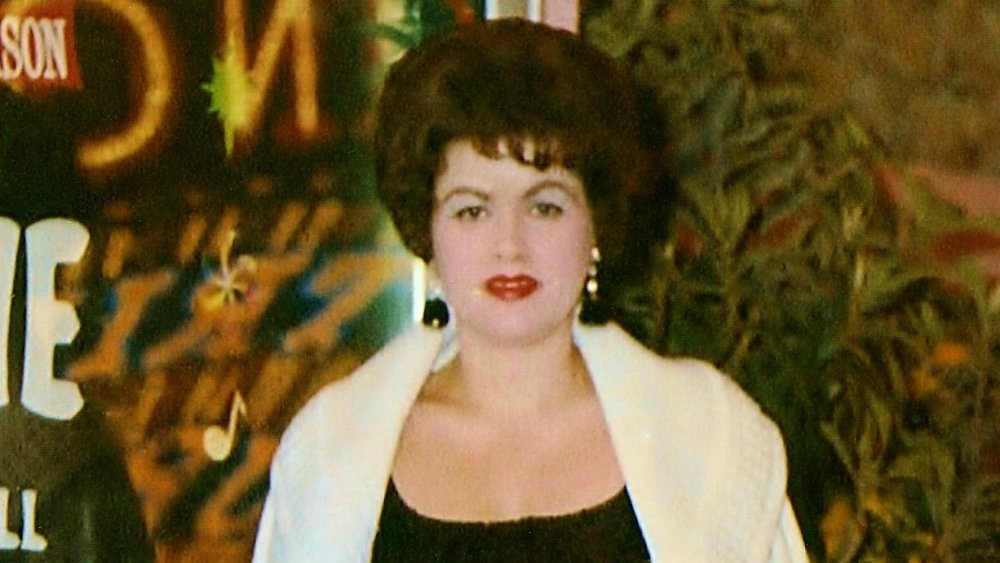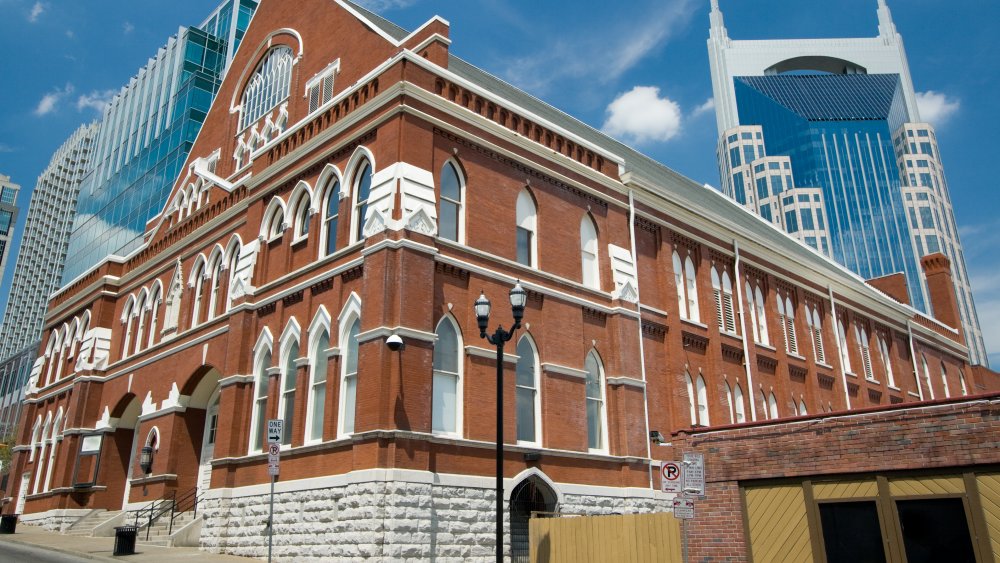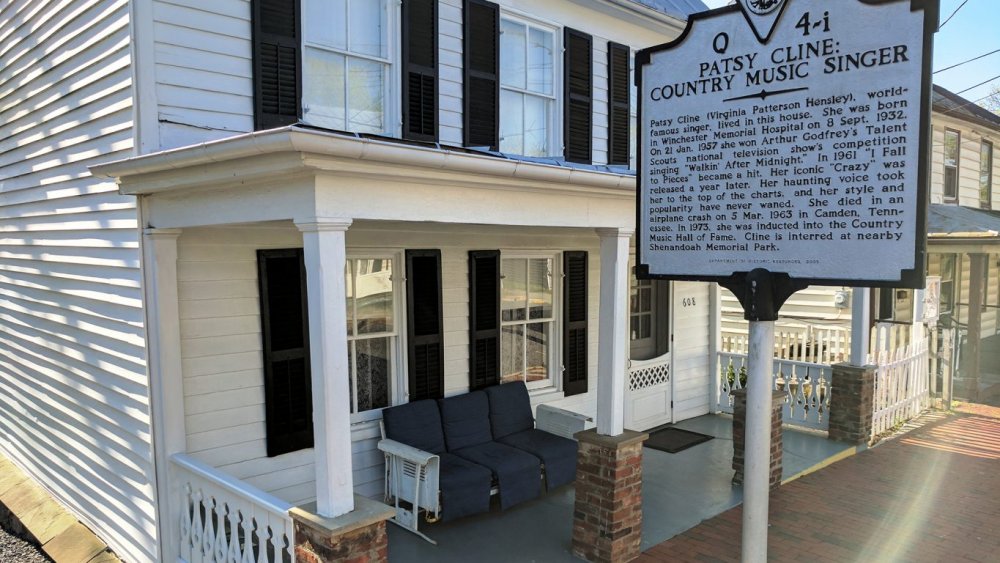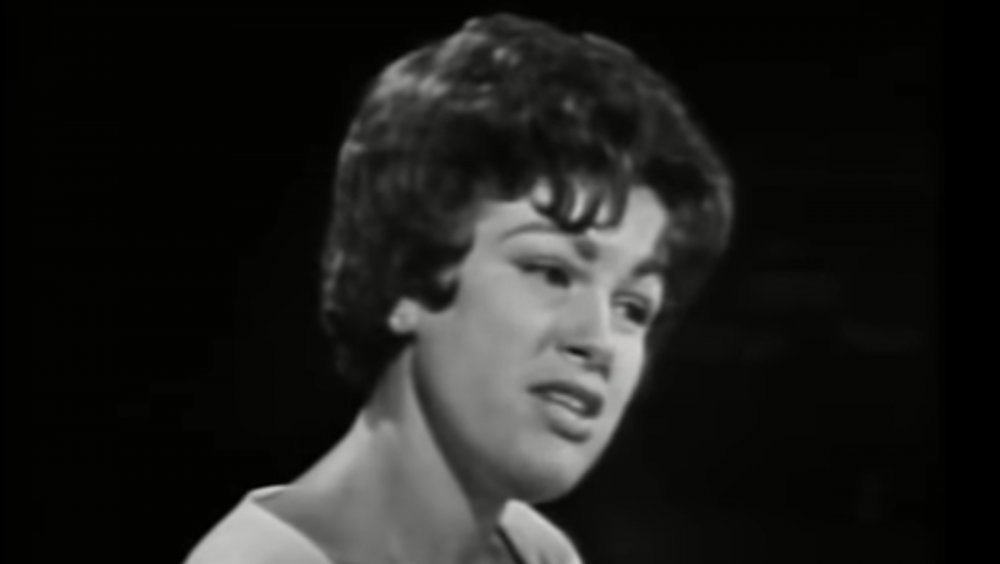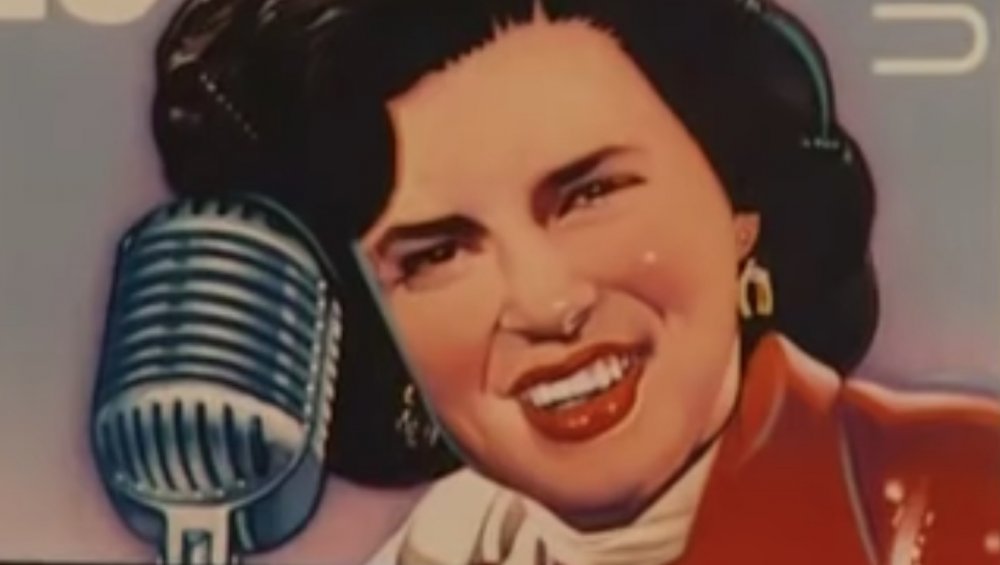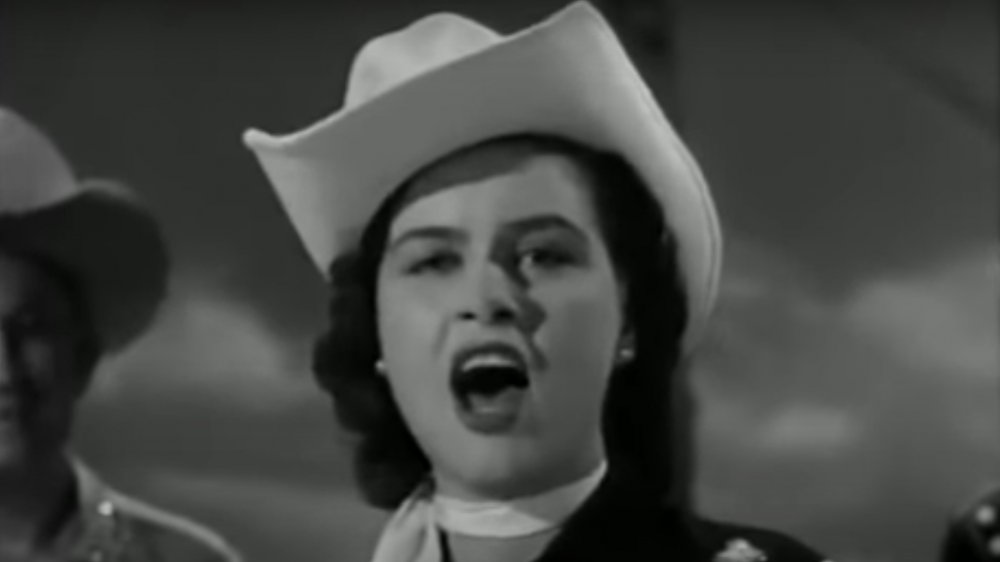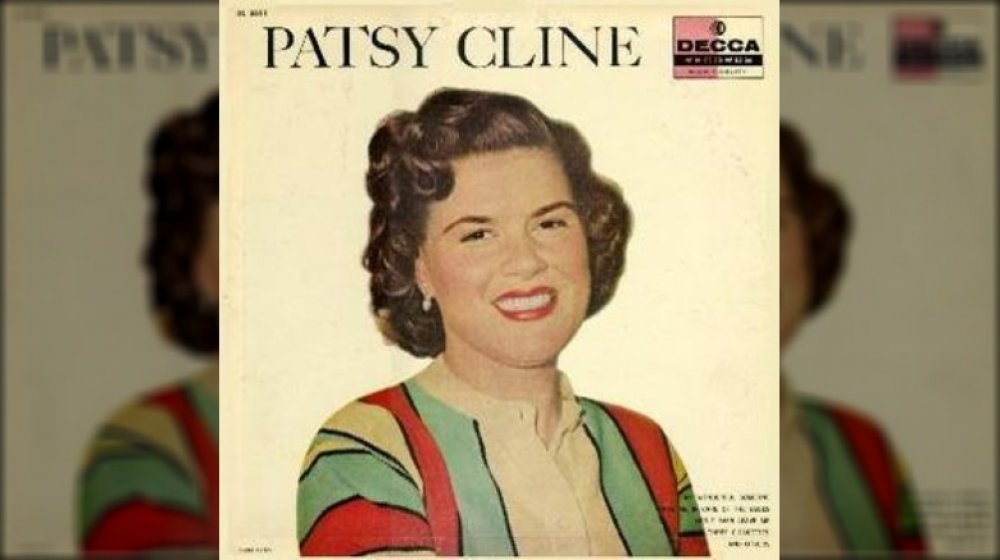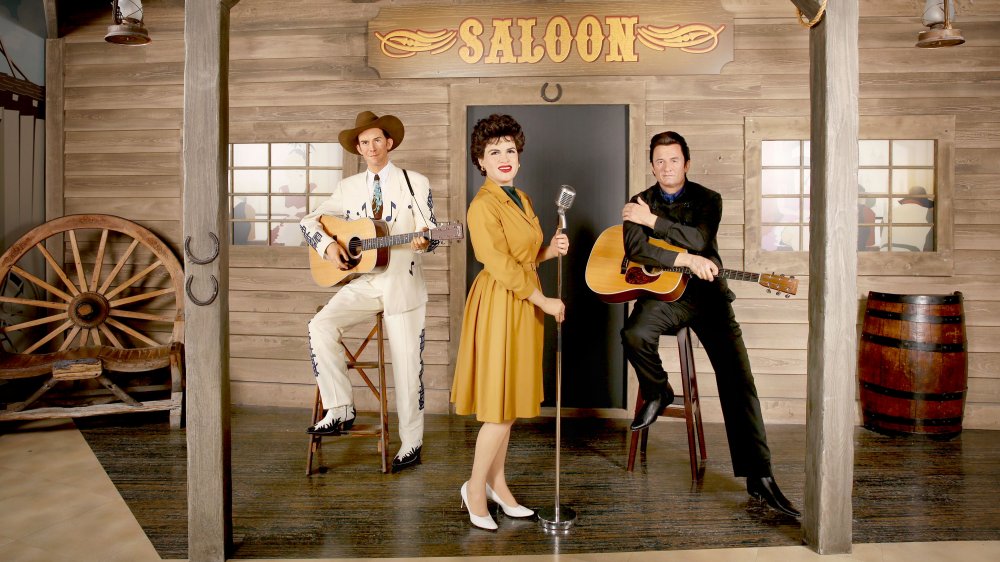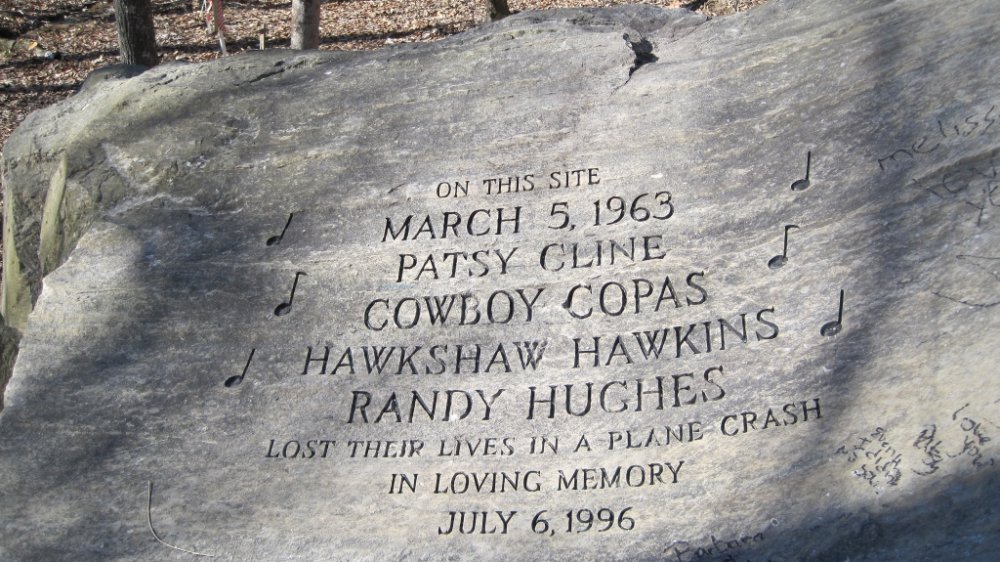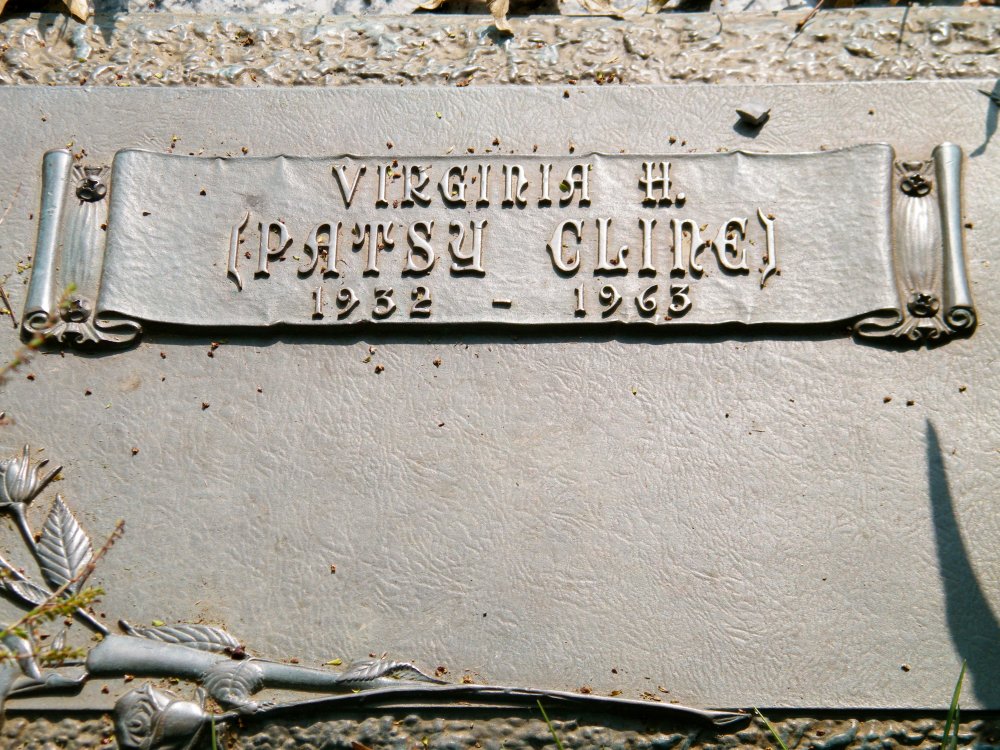The Tragic Real-Life Story Of Patsy Cline
An icon known for her smooth, sentimental vocals and for blazing a path for women in country music, Patsy Cline's life story is the epitome of a country music song — sweet dreams of love and fame punctuated by tough breaks and hard times, crazy adventures with friends and lovers underlined by dirty deals, and cheating death. Cline's legacy as one of the most influential voices in country music is as much notable for her cross-genre appeal into pop music and pioneering the Nashville Sound as it is for swearing with abandon and calling everyone she knew "hoss."
"The Cline," as she often called herself, was the first female solo artist to become a member of the Grand Ole Opry and the first female solo artist inducted into the Country Music Hall of Fame. Sadly, though, that latter recognition would come posthumously. Cline's meteoric rise to fame would "Fall to Pieces" in Camden, Tennessee, in 1963 in a horrific plane crash, and though she'd only found renown the last two years of her life, in death, she would become a country music icon. This is the tragic real-life story of Patsy Cline.
Patsy Cline's transient early childhood
Virginia Patterson Hensley was born on a Thursday in September of 1932 — the eighth of the month to be exact. Her mother, Hilda Patterson Hensley, was just 16 years old when "Ginny" was born, but her father, Sam Hensley, was in his forties when she arrived in the world. Today, "Ginny" is more famously known as Patsy Cline. Times were tough for the Hensleys in the Shenandoah Valley of Virginia during the Great Depression, but music was a constant. Sam could barely provide his family with running water or an indoor toilet, yet a radio was always a staple and sometimes even a piano, according to the Baltimore Sun.
The Hensleys moved often in Ginny's early life, about 19 times before she turned 15, so that Sam could make a living as a blacksmith. The young girl took to music naturally, learning to play piano by ear and finding her voice at an early age. "I can still see her now as a five- and six-year-old, skipping down the street, singing at the top of her voice," recalled a family friend in the biography Honky Tonk Angel: The Intimate Story of Patsy Cline by Ellis Nassour. "Already she possessed a sassiness and the knowledge that she was someone special." Her musical talent was likely a gift she inherited from her amateur singer father who, unfortunately, was also abusive, according to the Country Music Hall of Fame.
Patsy Cline gets the fever
Patsy Cline once admitted to an interviewer that, "I can't read a note of music and I never took a singing lesson in my life." Still, young Virginia "Ginny" Hensley had dreams of making it big, of making it all the way to the Grand Ole Opry (then at the Ryman Auditorium) and into the homes of millions. But folks around town often reminded her not only that achieving fame was hard, but that it was nearly impossible for someone growing up "on the other side of the tracks." That kind of negativity failed to deter.
Hensley drew on those hardships instead and even turned her first brush with death into a musical advantage. At 13, she suffered a serious throat infection and was diagnosed with rheumatic fever. The disease can have long-term effects on the heart, joints, and brain if not treated, and although very rare today, back in those days it was much more common and often fatal. "I developed a terrible throat infection and my heart even stopped beating," the singer recalled in later years, according to Honky Tonk Angel. "The doctor put me in an oxygen tent. You might say it was my return to the living after several days that launched me as a singer."
As she sees it, that infection gave Hensley the memorable, booming singing voice that one day would find her "Walkin' After Midnight" on national television.
The messy business of chasing a dream
At the age of 14, a confident Patsy Cline (still known then as Virginia "Ginny" Hensley) walked into a local radio station in her hometown of Winchester, Virginia, got an audition on the spot, and landed her first singing gig. But the hyper-local fame didn't lead to instant renown. "She wasn't good, and her inexperience was obvious," recalled the station's manager in Nassour's biography, "... Eventually, she developed a good style."
Her father and mother split up when she was 16, some say because of infidelity and drinking but more likely because of Sam Hensley's transient work and Hilda Hensley's desire to put down roots. Ginny moved with her mother and two siblings to a blue-collar neighborhood in Winchester, Virginia, into a house without running water or electricity. To make ends meet, her mother worked as a seamstress, while Ginny found messy work in a poultry plant plucking chickens, scrubbing the Greyhound bus station, and jerking sodas at a local drug store, according to PBS Newshour.
Though enrolled in the local high school, Ginny never attended. "This is a woman who barely had an eighth-grade education, came from a single-parent home, worked to make ends meet to help feed the family, and still figured out how to work the music business," said Barbara Hall, director of the documentary Patsy Cline: American Masters.
Virginia Patterson Hensley becomes Patsy Cline
By 1952, Virginia Patterson Hensley was touring the local clubs regularly in the Virginia, Maryland, and Washington, DC, area with bandleader Bill Peer and his group, the Melody Boys and Girls. Peer encouraged her to take on a stage name, and Patsy — an homage to her middle name — was starting to emerge. It wasn't until she met and married Gerald Cline, a "short and heavyset" builder, a year later that Patsy Cline came to be. They met when she wasn't just Bill Peers' musical partner but also his lover, and the two carried on their affair throughout Patsy's marriage to Gerald, according to Honky Tonk Angel.
By 1955, Patsy was a regional star, now appearing on a local variety show that attracted DC politicians as much as country folks. All the while, she kept her sights on Nashville, and Gerald kept his eyes on making a home. He worked, she played gigs, and they passed like ships in the night. Eventually, "there wasn't much of a marriage," he recalled in Honky Tonk Angel. "It was her way or not at all. And that wasn't fair to me. For a long time, I tried but got nothing in return," For Patsy's part, she said, "In the beginning, Gerald and I had a good marriage, as marriages go. My problem was that I don't think I knew what love was."
By 1957, the marriage ended, but the name stuck.
Patsy Cline claws her way up but falls short
"Her voice was strong. Her attitude was strong. And I wouldn't want to go against her in any way," said Reba McEntire, country music artist, recalling Patsy Cline in Patsy Cline: American Masters. And that's exactly what Cline needed — a strong voice and an equally strong attitude — to break through the male-dominated country music scene. Once, when she asked for a raise from the variety show Town and Country Time, she was told she was "being paid more than enough for a woman in the business."
In 1954, Cline signed with Four Star Records, an independent label owned by William McCall, a talent scout with a "spotty reputation." It was a move that would turn out to be one of the biggest mistakes of her career, according to Honky Tonk Angel. The contract limited the vocalist to recording only songs McCall owned the publishing rights to, so he could make money off the rights and the record. She laid down four records with Four Star, all while struggling to pay her bills.
According to CMT News, Cline's personal letters and documents show that when her contract ended, she owed the label nearly $5,000 and hardly earned any royalties — only about 2 percent — even from her one hit recorded under Four Star, "Walkin' After Midnight."
Patsy Cline finds love while fame remains elusive
In 1956, with steady (albeit meager) earnings from Town and Country Time, Patsy Cline needed money just to keep food on the table. She received no royalties from Four Star because her records hadn't made "one red cent," so she signed for another year with the label on the promise of a quick $200, a move that locked her into another year of a bad deal, as told by Honky Tonk Angel. Cline went from gig to gig on a rickety old bus, sometimes traveling 12 hours at a clip, and worked well into the early morning hours on a pittance. Then, in the spring of that year, while performing at an armory dance near Winchester, she met Charlie Dick.
Charlie was described as "pretty wild," with a "reputation for drinking, picking fights, and being a ladies man." Meanwhile, Cline had a reputation for being "loose," according to Sweet Dreams: The World of Patsy Cline. "And while Patsy loved ... Charlie Dick ... to distraction, he was given to drink. And Charlie and Patsy's fights were legendary."
They married in 1957, and later that year, Dick was drafted into the Army. Cline gave birth to their first child in 1958, a daughter, and was for all intents and purposes a working single mother. According to CMT News, Cline struggled "paying the deposit to get her phone turned back on or to dole out money for much-needed car repairs."
A star is born ... then fades away
Patsy Cline's breakout performance came in 1957, when she earned her way onto the CBS show Arthur Godfrey's Talent Scouts, the American Idol of those days, with a worthy national audience. A little lie got her there. Godfrey required that only professional scouts — not family — bring talent to him to perform on the show, according to PBS' American Masters. So, Hilda Hensley posed as her daughter's talent scout and introduced Cline to the Godfrey audience ... never once mentioning the family connection. When Godfrey asked, "Known her all her life have you?" Hensely replied, "Just about."
Cline crooned out "Walkin' After Midnight" to overwhelming applause in the live audience, but her sound reached millions more watching at home with television, becoming ubiquitous. At the end, Godfrey asked, "Is that the first record you made?" "No, I've got four records made," Cline responded. "Have you had any hits?" Not one to her name at the point in her career, Cline admitted. "I've got a hunch this one is," the show host replied.
And Godfrey's hunch was right. The song — recorded with Four Star under her minimal-royalties contract — shot up the country charts and made the crossover to the pop charts too, a first for a female country artist at the time. By all accounts, according to Sweet Dreams: The World of Patsy Cline, her appearance on Talent Scouts was the pivotal moment in her career.
Patsy Cline's star rises and nearly falls, again
Patsy Cline's appearance on Talent Scouts put her name out into the world and broadcast her sound into millions of homes. True to Arthur Godfrey's hunch, "Walkin' After Midnight" was a hit, but the boost Cline sought from the show never came. Instead, she settled into life with Charlie Dick, who had returned from the Army in 1959, and their daughter. "It seemed like every time Patsy tried to stand up someone tried to knock her back down," country singer Bill Anderson, a contemporary of Cline's, told CBS News.
Then, in 1960, desperate for money, she signed onto a new record label, Decca Records, and laid down "I Fall to Pieces." This new Nashville Sound revived Cline's career, but she initially fought the cross-genre style. "What she really had was a pop voice in a country music head," her producer at the time, Owen Bradley, said in Patsy Cline: The Making of an Icon. "Until Patsy, no country female singer dared being smooth; they were all rough."
Cline finally earned a membership in the Grand Ole' Opry, a lifelong dream of hers. And then, in 1961, she had her second brush with death just months after giving birth to her son. At 28, Cline and her brother were involved in a near-fatal head-on car crash. Though scarred from reconstructive surgery on her face and in tremendous pain, Patsy Cline returned to performing later that year, according to Good Housekeeping.
A rising star falls for the last time
Patsy Cline's star power could not be denied, and her rising fan base could not be contained. "Right at the very time I needed you the most, you came through with the flying-est colors," Cline told fans during a performance post-car crash, according to Good Housekeeping. An in-residence at the Mint in Las Vegas soon followed (a first for a female country music singer), as did appearances at the Hollywood Bowl and Carnegie Hall, a performance for which Cline did not get paid. But with the exposure and radio play of "Leavin' on Your Mind" and "Crazy," Cline was on her way to stardom. In a letter to a friend, she wrote: "It's wonderful — but what do I do for '63? It's getting so even Cline can't follow Cline."
On March 3, 1963, Cline flew to Kansas City with her manager (the pilot) and two other country artists to perform at a fundraiser. Bad weather conditions rolled in, grounding flights. Singer Dottie West, worried about her good friend flying, offered Cline a car ride back to Nashville, according to Behind the Grand Ole Opry Curtain: Tales of Romance and Tragedy. Cline refused: "Don't worry about me, Hoss. When it's my time to go, it's my time to go."
Cline's time came March 5. The plane crashed just outside of Camden, Tennessee, pilot inexperience and weather conditions the cause. No one survived. Patsy Cline was gone at 30.
Patsy Cline's mythical quality in death
Patsy Cline's career spanned a short five years with a scant few hits, yet her staying power nearly six decades later is a testament to the significant impact she's had on music, history, and gender equality. Consider the words used to describe her — icon, trailblazer, a lady of firsts. "She kind of has this mythical quality ... and it's like people don't want to let her go," Sally McKellip, who wrote the play You Belong to Me: A Patsy Cline Story, told the Times-Picayune.
Since her death, Patsy Cline's memory, voice, and story stay alive through countless retrospectives, heartfelt accolades and hard-fought, well-earned awards. Her life story became the Oscar-nominated motion picture Sweet Dreams in the 1980s, and there are a number of documentaries and biographies about the iconic singer. She posthumously received a Grammy Lifetime Achievement award and was the first female solo artist to be inducted into the Country Music Hall of Fame in 1973. And her single "Crazy" is one of the most played jukebox songs of all time.
Amid all these musical accomplishments, it's still Patsy Cline — the friend, lover, mother, and daughter taken too soon — most often recalled and remembered. "It's wonderful that whenever her name is mentioned, people's voices fall and they become right sentimental," Maya Angelou, poet and civil rights activist, said about the singer in Patsy Cline: The Making of an Icon. "And, rightly so."
